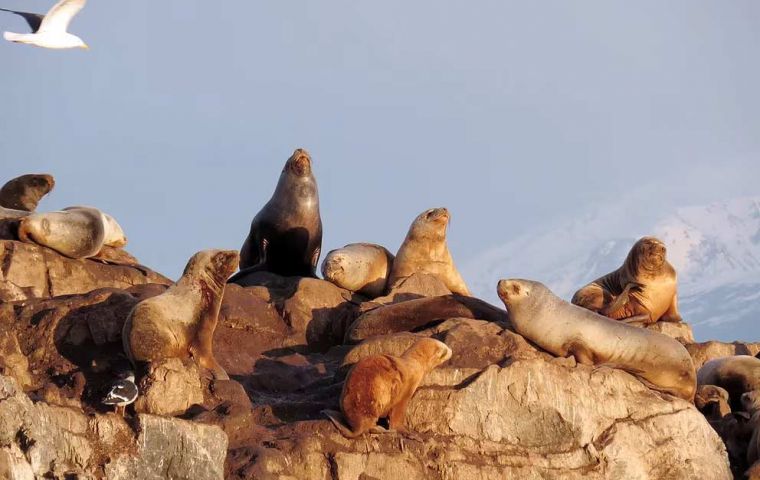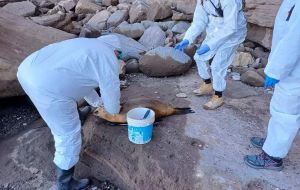MercoPress. South Atlantic News Agency
Mar del Plata breakwater closed due to sea lions dying of bird flu
 Sea lions would contract avian influenza through sick wild birds' excretions, Argentine experts speculate
Sea lions would contract avian influenza through sick wild birds' excretions, Argentine experts speculate Coast Guard and port authorities in the Argentine beach resort of Mar del Plata Saturday closed the South breakwater after the National Service of Agrifood Health and Quality (Senasa) confirmed two cases of the Highly Pathogenic Avian Influenza (HPAI) H5 in sea lions in the area where 4 dead specimens were found.
A fence was to be placed to keep people from approaching the animals, while an operation was deployed to prevent pedestrian traffic along the south breakwater, it was also reported. Senasa experts are holding meetings with municipal, provincial, and national institutions along the Atlantic coast to lay out an intervention protocol for these situations.
So far, more than 30 dead sea lions have been counted on the coast of Mar del Plata. Similar situations have been reported on the Buenos Aires province's Atlantic coast in places such as Necochea and Balnerario Orense, in addition to various locations along Argentine Patagonia (Puerto Loyola, Viedma, Tierra del Fuego). (Read also: https://en.mercopress.com/en.mercopress.com/2023/08/23/sea-lions-in-necochea-died-of-avian-flu2023/08/23/sea-lions-in-necochea-died-of-avian-flu)
Hence, Senasa issued a recommendation “not to handle dead animals or animals with suspicious symptoms” nor “visit poultry establishments or wild animal settlements after having been in contact with dead animals or animals that have presented symptoms” compatible with the malady.
In Senasa's expert opinion, “sea lions contract the disease from sick wild birds” releasing the virus through their excretions. “In the sea lion colonies there is a lot of contact between seabirds and also with marine mammals, the fecal matter is distributed everywhere,” the agency noted.
The specialists argue that “it is a matter of research, and we are working with other countries with the same findings to determine if there were mutations of the virus that are being transmitted from mammal to mammal.”
“On Wednesday, two samples were taken at the South breakwater. Upon registering the positive cases, we asked for cooperation from the Coast Guard so that there is a sanitary control zone of 3 kilometers,” Senasa Regional Director Manuel Baldovino said.
So far, three dead sea lions yielded negative laboratory results for avian flu. But positive cases were found in Río Grande (Tierra del Fuego); in Antarctica; in the Punta Bermeja Natural Protected Area (Río Negro); in Necochea (province of Buenos Aires), and in Punta Loyola (Santa Cruz).
Senasa also explained that the recent detections in marine mammals do not affect the animal health status self-declared before the World Organization for Animal Health, where Argentina is recognized as a country free of HPAI H5 in poultry.
Late last week, Senasa confirmed that the sea lions in the Port of Quequén, Necochea, had contracted avian influenza. Other samples from 40 fur seals found dead on the beaches of the Autonomous City of Buenos Aires (CABA) “are still under analysis.”
In addition, Río Negro Undersecretary of Environment and Climate Change of Río Negro Fabián Llanos told Télam that a restriction on the beaches at Punta Bermeja was determined as a precautionary measure.





Top Comments
Disclaimer & comment rulesCommenting for this story is now closed.
If you have a Facebook account, become a fan and comment on our Facebook Page!